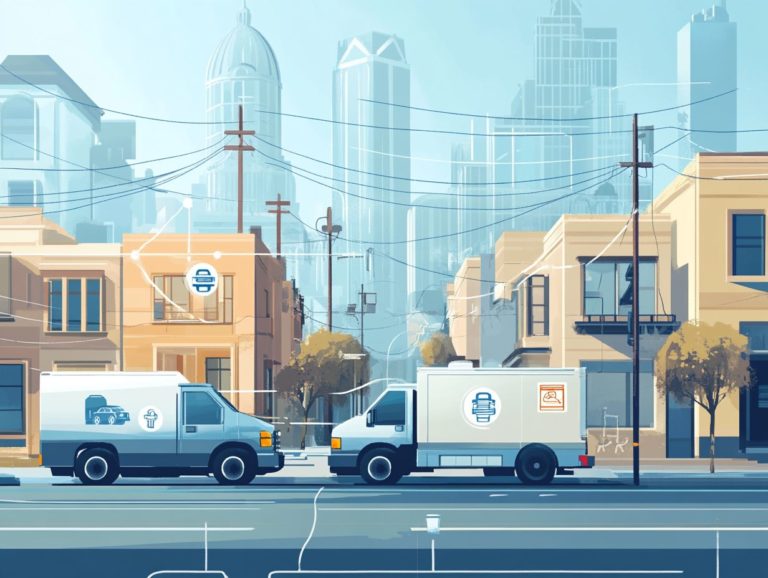Why You Should Consider Extra Coverage in Urban Areas
Living in urban areas presents a blend of excitement and opportunities. However, it also brings unique risks that can take residents by surprise.
From natural disasters such as floods and earthquakes to crime-related incidents, the threats are tangible. It s vital for you to grasp your current insurance coverage, as it may fall short in offering adequate protection.
This article delves into the significance of additional coverage, the specific types worth considering, and how to evaluate your needs. All aimed at providing you with peace of mind and financial security in an unpredictable landscape.
Contents
- Key Takeaways:
- The Risks of Living in Urban Areas
- Importance of Extra Coverage
- Types of Additional Coverage to Consider
- How to Determine the Right Amount of Additional Coverage
- Costs and Benefits of Extra Coverage
- Frequently Asked Questions
- Why should I consider extra coverage in urban areas?
- What types of risks are more prevalent in urban areas?
- Do insurance policies typically cover all potential risks in urban areas?
- How can extra coverage benefit me financially in urban areas?
- Can I add extra coverage to my existing insurance policy?
- Is extra coverage necessary for renters in urban areas?
Key Takeaways:

- Living in urban areas comes with its own set of risks and hazards, making extra insurance coverage a wise investment.
- Understanding your current insurance coverage is essential in determining the types and amount of extra coverage needed to adequately protect yourself and your belongings.
- Considering the financial costs and potential peace of mind and protection, it is important to carefully evaluate your risks and needs when deciding on extra coverage options.
The Risks of Living in Urban Areas
Living in urban areas of the U.S., like New York City and Los Angeles, comes with its own unique set of risks. These risks are largely rooted in concentrated poverty, a scarcity of affordable housing, and various community challenges.
These issues become even more pressing as population density increases. This creates substantial infrastructure hurdles. Local leaders and federal funding initiatives, such as Promise Zones, are essential in tackling these issues that affect the economy.
Their efforts aim to improve the quality of urban life and foster greater social mobility for residents from all walks of life.
Common Hazards and Threats
Urban areas encounter a range of pressing hazards and threats, including economic instability, subpar transportation options, and environmental challenges that disrupt urban ecosystems.
Crime rates emerge as a substantial risk, with some cities reporting figures up to 60% higher than the national average. This surge in crime can deter investment and result in lost job opportunities.
Health risks linked to pollution and insufficient healthcare facilities can significantly impact workforce productivity. Studies have shown that chronic health conditions can diminish economic output by as much as 20%.
Environmental threats, such as rising sea levels and increased flooding, further jeopardize local economies. This often leads businesses to either relocate or shutter their doors entirely.
Tackling these hazards is essential for enhancing job prospects and nurturing sustainable economic growth in urban environments.
Importance of Extra Coverage
In today s landscape of escalating costs for affordable housing and rental affordability, understanding the significance of additional insurance coverage is paramount for residents facing housing crises. Being proactive in this regard not only offers a safety net but also helps you navigate these challenging times with greater confidence and security.
Don t wait until it s too late secure additional coverage now!
Understanding Your Current Insurance Coverage
<pKnowing your current insurance coverage is essential, especially in urban environments where social disparities can create varying levels of protection and risk exposure.
In these densely populated settings, where both residential and commercial properties compete for limited space, you often find yourself navigating many choices in insurance. If you own property, homeowners insurance is a must; it offers protection against losses from events like fire, theft, or natural disasters.
For those renting an apartment or home, renters insurance provides similar coverage, ensuring that your personal belongings are well protected. Local leaders can greatly influence the types of policies available to you; regulations can dictate minimum coverage levels or even specific riders that urban residents must have.
Comprehensive coverage not only alleviates the financial burdens associated with unexpected incidents but also instills a sense of security within the community, enabling urban dwellers to invest in their homes and neighborhoods with confidence.
Types of Additional Coverage to Consider

In urban environments, it s essential to consider a range of additional coverages, including flood insurance, earthquake insurance, and crime insurance. This is particularly important due to the unpredictable dynamics of urban ecosystems, where risks can emerge unexpectedly.
Being proactive in securing comprehensive coverage protects your assets and provides peace of mind amidst the uncertainties of city life.
Flood Insurance
Flood insurance is crucial for urban residents. Climate change increases the frequency and severity of floods, affecting both property values and safety.
In densely populated areas, the built environment can worsen water runoff issues. Securing flood insurance acts as a safety net for homeowners who might suddenly face significant repair costs due to water damage.
The availability of flood insurance also affects property values. Homes in areas with strong coverage options generally hold their worth better than those without. In regions vulnerable to flooding, maintaining the health of the environment is vital, as shifts in water levels can disrupt local ecosystems.
For urban dwellers, investing in flood insurance isn t just about personal safety; it s a responsible choice that enhances the resilience of your community as a whole.
Earthquake Insurance
Earthquake insurance is a vital safety net for urban residents, especially in areas where earthquakes pose a substantial risk to both urban ecosystems and infrastructure.
As earthquakes become more frequent particularly in populated regions like California and Japan the financial ramifications can be devastating. Studies reveal that nearly 60% of homeowners in high-risk zones lack adequate coverage, leaving them exposed to the financial fallout of property damage.
Engaging communities to highlight the importance of earthquake preparedness and insurance can significantly bridge this coverage gap. Local organizations and government bodies play a crucial role in spreading awareness, ensuring residents understand the risks they face and the proactive steps they can take.
Awareness campaigns enhance community resilience, fostering a culture of preparedness that benefits individuals and uplifts entire neighborhoods during times of crisis.
Crime Insurance
Crime insurance has become increasingly relevant in urban areas where concentrated poverty heightens the risk of property crimes and personal safety concerns.
In these settings, you might often feel vulnerable to theft and vandalism. Considering this form of protection is essential for safeguarding your property. As neighborhoods grapple with high crime rates, the financial implications of these offenses can be staggering.
Local leaders can partner with community organizations to implement programs focused on crime reduction. Initiatives like neighborhood watch schemes and youth engagement programs can strengthen community ties, while police-community partnerships foster trust and enhance safety.
By educating yourself on crime prevention strategies, you empower yourself to take proactive measures that contribute to a more secure urban environment.
How to Determine the Right Amount of Additional Coverage
Determining the ideal amount of additional coverage involves a meticulous assessment of your risks. In urban environments, housing recovery initiatives and investment opportunities can profoundly impact your insurance requirements.
Don t wait until disaster strikes. Evaluate your coverage options today!
Evaluating Your Risks and Needs

Evaluating your risks and needs is a crucial step in selecting the right insurance coverage, especially in urban environments characterized by a high demand for affordable housing and fluctuating federal funding.
In these settings, you may encounter unique challenges shaped by local economic shifts, employment rates, and the overall stability of your community. To navigate these complexities, assess your financial situation against recent statistics indicating that nearly 30% of households are cost-burdened, dedicating more than 30% of their income to housing.
By understanding government initiatives related to affordable housing, you can gain valuable insights into potential changes in funding that could impact your coverage options. Staying informed about these dynamics enables you to identify your specific insurance needs and effectively mitigate potential risks.
Costs and Benefits of Extra Coverage
Grasping the costs and benefits of additional coverage is essential for urban residents, as financial factors directly influence their peace of mind and safeguard against potential risks.
When you make informed choices, you can feel secure in your urban adventures!
Financial Considerations
Financial considerations are crucial when assessing the feasibility of extra coverage, particularly in urban areas where rental affordability and economic stability present significant challenges.
This dynamic intensifies as you explore how social disparities influence individuals’ decisions regarding insurance and supplementary coverage. For instance, recent research indicates that nearly 30% of low-income households skip essential insurance plans that help them during emergencies due to cost constraints, which jeopardizes their financial security.
Urban areas marked by high-income inequality often show a clear link between lack of coverage and heightened financial strain within marginalized communities. These statistics reveal that financial limitations shape immediate decisions and cast long shadows over overall economic well-being.
Peace of Mind and Protection
You need adequate insurance coverage for peace of mind and protection. This allows you to pursue entrepreneurial opportunities without the constant worry of financial loss.
This sense of security serves as the backbone of your successful ventures, whether you re launching a tech startup or running a charming caf in a bustling city center. Host events with confidence! Your comprehensive liability insurance has you covered against unforeseen setbacks like natural disasters or legal challenges.
For instance, if you re a restaurant owner investing in comprehensive liability insurance, you can confidently host events, assured that if an incident occurs, your coverage will help cushion the financial blow. This not only fuels your innovation but also cultivates a supportive community where entrepreneurs like you can thrive, all supported by the peace of mind that comes from having adequate insurance.
Frequently Asked Questions
Why should I consider extra coverage in urban areas?

Urban areas have a higher population density and more potential risks. Extra coverage is a wise decision for protection against unexpected events.
What types of risks are more prevalent in urban areas?
- Higher crime rates
- More traffic accidents
- Increased instances of property damage
These factors make it important to have extra coverage for potential losses.
Do insurance policies typically cover all potential risks in urban areas?
No, most insurance policies have limitations and exclusions for certain types of risks. Having extra coverage can help fill in these gaps and provide more comprehensive protection.
Explore your insurance options today!
How can extra coverage benefit me financially in urban areas?
Extra coverage eases the financial stress of unexpected events like car accidents or property damage. It provides you with essential funds for repairs or replacements.
Can I add extra coverage to my existing insurance policy?
Yes! Many insurance companies allow you to enhance your policy with additional coverage for a small extra cost.
Is extra coverage necessary for renters in urban areas?
Absolutely! Renters often lack coverage under their landlord’s insurance. This makes extra coverage vital to protect against risks like theft or liability for accidents in your rental.






